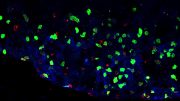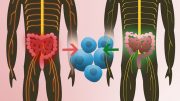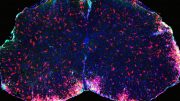
New research reveals that auto-reactive T cells in MS patients produce unique inflammatory cytokines, presenting potential avenues for innovative disease treatments. Credit: Image courtesy of MIT
New research shows that auto-reactive T cells in MS patients produce different types of inflammatory hormones called cytokines than they do in healthy subjects, opening the door to new treatments for the disease.
Evidence has long suggested multiple sclerosis (MS) is an autoimmune disease, but researchers have been puzzled because they found the same T cells that attack the myelin sheathing around nerve cells in MS patients are present in healthy subjects as well.
Now researchers from the Yale School of Medicine and colleagues at the Massachusetts Institute of Technology (MIT) report that auto-reactive T cells in MS patients produce different types of inflammatory hormones called cytokines than they do in healthy subjects.
“In most people, these T cells are acting to repair tissue, but in MS patients, they do damage to the nervous system,” said Dr. David Hafler, the William S. and Lois Stiles Edgerly Professor of Neurology and senior author of the study, published May 14 in the journal Science Translational Medicine.
The Yale-led team analyzed T cell populations from 23 MS patients and 22 healthy controls. Existing drugs can target the MS-specific cytokines identified in the study and should be a promising new treatment for the disease, the authors say.
Hafler also noted that the same sort of process might be found in other autoimmune diseases, such as rheumatoid arthritis and Type 1 diabetes.
Yonghao Cao of Yale and Brittany A. Goods of MIT are co-first authors of the paper.
The research was funded by the National Institutes of Health and the National Multiple Sclerosis Society.
Reference: “Functional inflammatory profiles distinguish myelin-reactive T cells from patients with multiple sclerosis” by Yonghao Cao, Brittany A. Goods, Khadir Raddassi, Gerald T. Nepom, William W. Kwok, J. Christopher Love and David A. Hafler, 13 May 2015, Science Translational Medicine.
DOI: 10.1126/scitranslmed.aaa8038









Confused because ‘existing drugs’ target these different hormones produced by cytokines?
I believe the author means that there are existing drugs out there that they can use to target the MS-specific cytokines identified in the study…I made a small correction to reflect this. Now reads, “Existing drugs can target the MS-specific cytokines identified in the study and should be a promising new treatment for the disease, the authors say.”
While your article is well written I sort of feel that it also leaves those of us with this disease no more closer to help than we were before we read this…Why not list the names of some of these medications?
While there are not many effective medications out there, I know a few people who have sought out natural treatment methods.